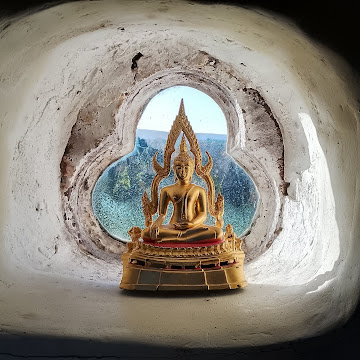2025-04-30
Jataka 305: Sīlavimaṁsana Jātaka
Na atthi loke raho nāma pāpakammaṁ pakubbato,
passanti vanabhūtāni, taṁ bālo maññatī raho.
Jataka 305: Sīlavimaṁsana Jātaka (Jātakatthavaṇṇanā)
Atīte Bārāṇasiyaṁ Brahmadatte rajjaṁ kārente Bodhisatto brāhmaṇakule nibbattitvā vayappatto tatth'eva
Bārāṇasiyaṁ disāpāmokkhassa santike pañcannaṁ māṇavakasatānaṁ jeṭṭho hutvā sippaṁ uggaṇhi.
| Atīte | In the past (locative of time) |
| Bārāṇasiyaṁ | in Bārāṇasī (locative) |
| Brahmadatte | Brahmadatta (locative, "during the reign of") |
| rajjāṁ kārente | ruling the kingdom (present participle of karoti) |
| vayappatto | come of age (past participle) |
| māṇavako | young boy |
| jeṭṭho | eldest |
| hutvā | having become (absolutive of hoti) |
| sippaṁ | craft |
| uggaṇhi | he learned (past tense) |
Ācariyassa vayappattadhītā atthi.
So cintesi: "imesaṁ māṇavakānaṁ sīlaṁ vīmaṁsitvā sīlasampannass'; etaṁ dassāmīti".
| vīmaṁsitvā | investigate, test |
| sīlasampannassa | to the virtuous one (genitive/dative) |
| etaṁ dassāmi | I will give this |
so ekadivasaṁ māṇavake āmantetvā "tātā, mayhaṁ dhītā vayappattā
vivāhaṁ assā kāressāmi vatthālaṁkāraṁ laddhuṁ vaṭṭati
tumhe attano ñātakānaṁ apassantānaṁ thenetvā
| vivāha | giving of a daughter in marriage |
| vatthālaṁkāraṁ | cloths + ornaments (alaṁ + karoti = make yourself ready) |
| theneti | to steal [√then] |
vatthālaṁkāre āharatha
kenaci adiṭṭham eva gaṇhāmi dassetvā ābhataṁ na gaṇhāmīti\"
Te "sādhū" ti sampaṭicchitvā tato paṭṭhāya ñātakānaṁ apassantānaṁ thenetvā
| ābhataṁ | brought pp of ābharati |
| sampaṭicchati | to agree, accept |
| paṭṭhāya | since then... |
vatthapilandhanādīni āharanti. ācariyo ābhataṁ ābhataṁ visuṁ visuṁ yeva ṭhapesi.
Bodhisatto na kiñci āhari Atha naṁ ācariyo āha:
"tvaṁ pana tāta na kiñci āharasīti"
"Āma ācariyā" ti
"Kasmā tātā" ti
"Tumhe kassaci passantassa ābhataṁ na gaṇhatha,
ahaṁ pana pāpakaraṇe raho na passāmīti\"
| ādi | nt. etc.; and so on; and so forth; lit. beginning with |
| visuṁ | ind. separately; singly; individually |
| ṭhapesi | ṭhapeti 5: pr. (+acc) places; puts; stands; lit. causes to stand [√ṭhā + *āpe + ti] |
dīpento ime dve gāthā āha:
N'atthi loke raho nāma pāpakammaṁ pakubbato
passanti vanabhūtāni, taṁ bālo maññatī raho
Ahaṁ raho na passāmi, suññaṁ vāpi na vijjati
yattha aññaṁ na passāmi asuññaṁ hoti tam mayā ti
| dīpento | dīpeti 1: pr. (+acc) explains; illustrates; illuminates; lit. shines [√dīp + *e + ti] |
Commentaries about "Arahant"
Why is the Buddha called Arahat? (wisdomlib.org)
(1) Ara means enemy (ari) and hat means to kill (han). The expression therefore means "killer of enemies".
Vism. I 198 (DPR, SSP): te cānena kilesārayo maggena hatāti arīnaṁ hatattāpi arahaṁ.
(2) Furthermore, A marks negation and rahat means 'to be born'. The expression means, therefore, "unborn".
(3) Finally, Arhat means worthy (arhat) of receiving worship (pūja). The fetters (saṃyojana) have been cut in the Buddha, he has attained omniscience (sarvajñāta); therefore he merits receiving the worship of beings in heaven and on earth. This is [71c] why the Buddha is called Arhat.
Vism. I 201 (DPR, SSP): Aggadakkhiṇeyyattā ca cīvarādipaccaye arahati pūjāvisesañca. teneva ca uppanne tathāgate yekeci mahesakkhā devamanussā, na te aññattha pūjaṁ karonti.
Visuddhimagga I 198 (PDF): Tattha ārakattā arīnaṁ... (DPR, SSP) Bhagavā arahan ti veditabbo.
(125.) tattha ārakattā arīnaṁ arānañca hatattā paccayādīnaṁ arahattā pāpakaraṇe rahābhāvāti imehi tāva kāraṇehi so bhagavā arahanti anussarati. ārakā hi so sabbakilesehi suvidūravidūre ṭhito maggena savāsanānaṁ kilesānaṁ viddhaṁsitattāti ārakattā arahaṁ.
so tato ārakā nāma, yassa yenāsamaṅgitā.
asamaṅgī ca dosehi, nātho tenārahaṁ matoti.(126.) te cānena kilesārayo maggena hatāti arīnaṁ hatattāpi arahaṁ.
yasmā rāgādisaṅkhātā, sabbepi arayo hatā.
paññāsatthena nāthena, tasmāpi arahaṁ matoti.
- "Because he is far away (āraka) [from the passions],
- because he has destroyed the enemies (ari) [i.e., the passions],
- because he has broken the spokes (ara) [of the wheel of existence],
- because he is worthy (araha) of receiving the necessities,
- because he stays apart from evil actions
for all these reasons the Blessed One is called Arahant."
See also Majjhima, I, p. 280; Aṅguttara, IV, p. 145.
M I 280 (PDF) is the end of MN 39 Mahāassapurasutta (SC)
Kathañca, bhikkhave, bhikkhu arahaṁ hoti? Ārakāssa honti pāpakā akusalā dhammā, saṅkilesikā, ponobbhavikā, sadarā, dukkhavipākā, āyatiṁ, jātijarāmaraṇiyā. Evaṁ kho, bhikkhave, bhikkhu arahaṁ hotī"ti.
A IV 145 (PDF) is AN 7.92 Arahāsutta (SC)
"Ārakattā arahā hoti. Katamesaṁ sattannaṁ? Sakkāyadiṭṭhi ārakā hoti, vicikicchā ārakā hoti, sīlabbataparāmāso ārako hoti, rāgo ārako hoti, doso ārako hoti, moho ārako hoti, māno ārako hoti. Imesaṁ kho, bhikkhave, sattannaṁ dhammānaṁ ārakattā arahā hotī"ti.
arahattamagga (8920/dpd)
(PMa) kilesehi ārakattā, kilesārīnaṁ hatattā, saṁsāracakkassa arānaṁ hatattā, pāpakaraṇe rahābhāvā, paccay'ādīnaṁ arahattā arahaṁ, arahato bhāvo arahattaṁ. kiṁ taṁ? arahattaphalaṁ. arahattassa maggo arahattamaggo.
arahant (8928/dpd)
(MNa) tehi ārakattā arahaṁ hoti, dūrībhūtattā'ti attho.
(SNa) ārakā kilesehī'ti arahanto.
